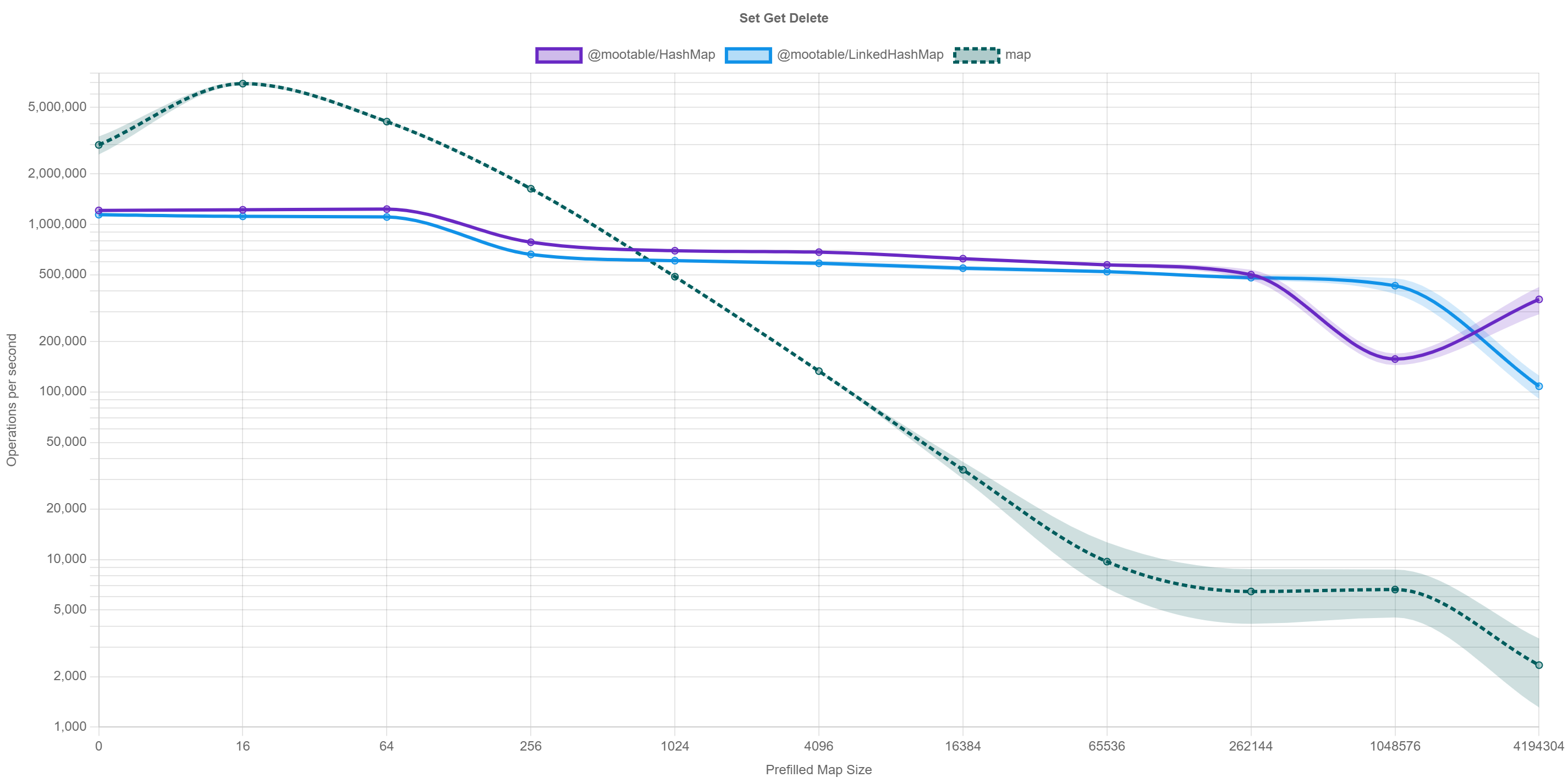@mootable/hashmap v1.0.7
HashMap & LinkedHashMap
Description
This project provides HashMap and LinkedHashMap classes that works both on Node.js and the browser.
- They are both implementations of a simplified HAMT like hash trie
- It uses a modified Murmer 3 algorithm for generating hashes. This ensures the widest possible spread across all buckets.
- As per spec, the basic
Hashmapis not guaranteed to meet order of insertion when iterating over it. If you want guaranteed insertion order when iterating, useLinkedHashMap. - The keys are truly typed and unique, this means 1 !== "1".
Choose your map wisely.
- When choosing a collection it is worth understanding the problem you are trying to solve.
- Native JS Map for small numbers of entries, will be significantly faster.
- However once the map reaches 1'000 or more the Mootable Hashmap really shows its strengths. It utilizes more memory, to do this.
- The Native JS Map is likely to have improved speed characteristics if repeating operations in a loop, via things such as JIT compilation. It is worth benchmarking to see if Map works better for you in those situations.
Installation
Using npm:
$ npm install @mootable/hashmapYou can download the last stable version from the releases page.
If you like risk, you can download the latest master version, it's usually stable.
To run the tests:
$ npm testTo run the benchmarks: (Ensure you have the memory to run them)
If you don't you can reduce the memory size (in MB) accordingly
--max_old_space_sizeand remove the last items inMAP_SIZES$ node --max_old_space_size=24576 --expose-gc test\benchmark.js
API Documentation
- For Full HTML Documentation with Examples please visit Here
- For Full Markdown Documentation please visit Here
Importing
Node ESModules
import {HashMap, LinkedHashMap} from '@mootable/hashmap';Node CommonJS
const {HashMap, LinkedHashMap} = require('@mootable/hashmap');Browser
<!-- Or one of the other provided alternates (see dist folder) -->
<script src="pathToFile/hashmap.umd.min.js"></script>
<script type="text/javascript">
// By Default Mootable is on the global scope.
const HashMap = Mootable.HashMap;
const LinkedHashMap = Mootable.LinkedHashMap;
</script>HashMap constructor
This HashMap is backed by a hashtrie.
new HashMap()creates an empty hashmapnew HashMap(copy:Iterable)creates a hashmap which is a copy of the provided iterable. 1)copyeither- an object that provides a forEach function with the same signature as
Map.forEach, such asMapor thisHashMapandLinkedHashMap - or a 2 dimensional key-value array, e.g.
[['key1','val1'], ['key2','val2']].
- an object that provides a forEach function with the same signature as
LinkedHashMap constructor
LinkedHashMap maintains insertion order of keys, it has a slightly larger memory footprint and is a little slower.
new LinkedHashMap()creates an empty linked hashmapnew LinkedHashMap(copy:Iterable)creates a linked hashmap which is a copy of the provided iterable. 1)copyeither- an object that provides a forEach function with the same signature as
Map.forEach, such asMapor thisHashMapandLinkedHashMap or a 2 dimensional key-value array, e.g.
[['key1','val1'], ['key2','val2']].
- an object that provides a forEach function with the same signature as
Examples
HashMap and LinkedHashMaps, have the same constructor options, and are created in the same way..
Create an empty HashMap
const hashmap = new HashMap();
// hashmap.size === 0;Create a LinkedHashMap from an array of key value pairs
const arr = [[1,'value1'],[2,'value2'],[3,'value3']];
const hashmap = new LinkedHashMap(arr);
// hashmap.size === 3;Create HashMap from another map
const map = new Map([[1,'value1'],[2,'value2'],[3,'value3']])
const hashmap = new HashMap(map);
// hashmap.size === 3;Create LinkedHashMap from another HashMap
const first = new HashMap([[1,'value1'],[2,'value2'],[3,'value3']])
const hashmap = new LinkedHashMap(first);
// hashmap.size === 3;Create a HashMap from a class with symbol
class MyIterable {
*[Symbol.iterator] () {
yield ["key1", "value1"];
yield ["key2", "value2"];
yield ["key3", "value3"];
yield ["key4", "value4"];
}
}
const iterable = new MyIterable();
const hashmap = new HashMap(iterable);
// hashmap.size === 4;
// it doesn't have to be a generator, an iterator works too.Create a LinkedHashMap from an object with an entries' generator function
const entriesObj = {
entries: function* () {
yield ["key1", "value1"];
yield ["key2", "value2"];
yield ["key3", "value3"];
yield ["key4", "value4"];
}
}
const hashmap = new LinkedHashMap(entriesObj);
// hashmap.size === 4;
// it doesn't have to be a generator, an iterator works too.Create HashMap from an object with a forEach function
const forEachObj = {
forEach: (callback, ctx) => {
for (let i = 1; i <= 4; i++) {
callback.call(ctx, 'value' + i, 'key' + i);
}
}
};
const hashmap = new HashMap(forEachObj);
// hashmap.size === 4;Benchmarks
- Current Benchmarks can be found under benchmark_results.
- The default benchmark does a single set, get and delete against a hashmap of a specific size. It does this thousands of times, and finds an approximate average.
- If you would like me to include your library for benchmarking, raise an issue in github.
- It must be in NPM
- It must have an identical interface to JS Map
- It must be fully written in JS. (Transpiling is acceptable) So that we can guarantee it works in the browser, not just node.
Benchmarks on version 1.0.7

Background
- This repository is a reimplemented version of the npm hashmap repository. It takes that implementation as a starting point, and moves it closer to the core functionality hashmaps are designed to achieve.
- The tests have remained mostly the same, as has some documentation, everything else has changed. The interfaces have now diverged.
LICENSE
The MIT License (MIT)
Copyright (c) 2021 Jack Moxley
Permission is hereby granted, free of charge, to any person obtaining a copy of this software and associated documentation files (the "Software"), to deal in the Software without restriction, including without limitation the rights to use, copy, modify, merge, publish, distribute, sublicense, and/or sell copies of the Software, and to permit persons to whom the Software is furnished to do so, subject to the following conditions:
The above copyright notice and this permission notice shall be included in all copies or substantial portions of the Software.
THE SOFTWARE IS PROVIDED "AS IS", WITHOUT WARRANTY OF ANY KIND, EXPRESS OR IMPLIED, INCLUDING BUT NOT LIMITED TO THE WARRANTIES OF MERCHANTABILITY, FITNESS FOR A PARTICULAR PURPOSE AND NONINFRINGEMENT. IN NO EVENT SHALL THE AUTHORS OR COPYRIGHT HOLDERS BE LIABLE FOR ANY CLAIM, DAMAGES OR OTHER LIABILITY, WHETHER IN AN ACTION OF CONTRACT, TORT OR OTHERWISE, ARISING FROM, OUT OF
5 years ago
5 years ago
5 years ago
5 years ago
5 years ago
5 years ago
5 years ago
5 years ago
5 years ago
5 years ago
5 years ago
5 years ago
5 years ago
5 years ago
5 years ago
5 years ago
5 years ago
5 years ago
5 years ago
5 years ago
5 years ago
5 years ago
5 years ago
5 years ago
5 years ago
5 years ago
5 years ago
5 years ago
5 years ago
5 years ago
5 years ago
5 years ago
5 years ago
5 years ago
5 years ago
5 years ago
5 years ago
5 years ago
5 years ago
5 years ago
5 years ago
5 years ago

